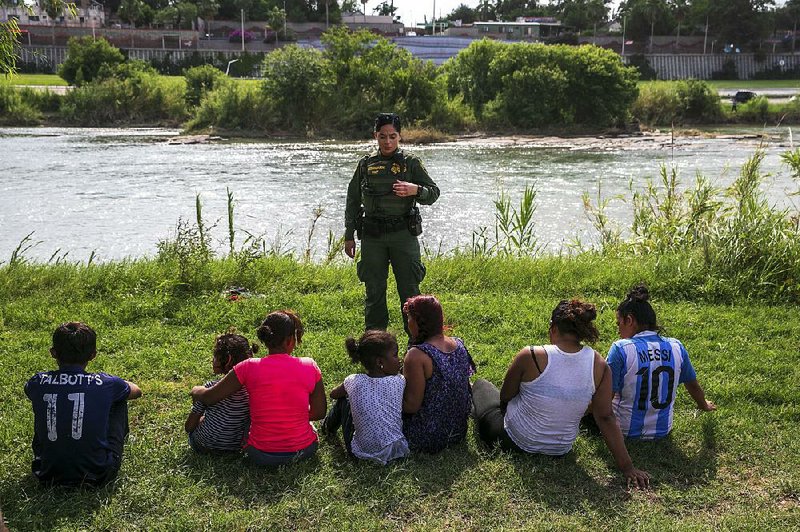LOS ANGELES -- A U.S. judge on Friday blocked new rules that would enable the federal government to keep migrant children with their parents in detention facilities indefinitely.
U.S. District Judge Dolly Gee issued the permanent injunction Friday, hours after hearing arguments from the U.S. Department of Justice and from advocates for migrants in a long-running federal case in the Central District of California.
Lawyers for the Justice Department had urged Gee to allow President Donald Trump's administration to withdraw from the Flores agreement, a 1997 federal consent decree that sets basic standards for detaining migrant children. The decree requires the government to release migrant children caught on the border to relatives in the U.S. within 20 days, and it says the children can only be held in facilities licensed by a state to care for minors.
Trump has called the Flores agreement -- named for a teenage plaintiff -- a "loophole" that has enabled hundreds of thousands of families, many from impoverished Central American countries, to cross the U.S.-Mexico border and claim asylum. Those migrants generally are quickly released into the United States because of the 20-day limit on detaining children.
The Department of Homeland Security and the Department of Health and Human Services issued new rules in August that sought to terminate the settlement and lift the 20-day limit by allowing the federal government to license such facilities.
But in the ruling Friday, Gee said the agreement will remain in place and govern the conditions for all migrant children in U.S. custody, including those with their parents.
"The agreement has been necessary, relevant, and critical to the public interest in maintaining standards for the detention and release of minors arriving at the United States' borders," the judge wrote in her decision.
Gee wrote that the Trump administration's proposed regulations "fail to implement and are inconsistent with the relevant and substantive terms of the Flores Settlement Agreement," and therefore cannot take effect, noting that the agreement is a binding contract that was never appealed.
"Defendants cannot simply ignore the dictates of the consent decree merely because they no longer agree with its approach as a matter of policy," she wrote. "Defendants cannot simply impose their will by promulgating regulations that abrogate the consent decree's most basic tenets."
Attorneys who represent detained migrant children welcomed Gee's position, which she initially conveyed to them in a draft ruling during a court hearing Friday. They said they wouldn't let the Trump administration use the detention of young migrants to try to deter other migrants from seeking asylum in the United States.
"We will continue vigorously to defend the rights of detained immigrant children," Neha Desai, director of immigration at the National Center for Youth Law, told reporters.
JUSTICE AGENCY RESPONSE
The Justice Department is widely expected to appeal the decision, but a spokesman for the department did not signal the administration's next steps Friday. A Justice Department spokesman said the government followed the Flores agreement in implementing the new rules.
"The Department of Justice is disappointed that the court is continuing to impose the outdated Flores Agreement even after the government has done exactly what the Agreement required: issue a comprehensive rule that will protect vulnerable children, maintain family unity, and ensure due process for those awaiting adjudication of their immigration claims," the Justice Department statement said. "The Trump Administration will continue to work to restore integrity to our immigration system and ensure the proper functioning of the duly enacted immigration laws."
Withdrawing from the settlement is part of an assortment of immigration enforcement measures designed to reduce the flow of Central American families and unaccompanied minors across the U.S.-Mexico border.
Rep. Joaquin Castro, D-Texas, chairman of the congressional Hispanic Caucus, hailed the ruling Friday.
"I am pleased that our justice system has stopped the Trump Administration plans to indefinitely detain families in prisonlike conditions," Castro said. "This victory gives us hope and is a reminder to us all -- elected officials, immigration lawyers, organizers and advocates -- to keep fighting. Flores is not a loophole -- it's a lifesaving standard that protects the basic rights and dignity of migrant children."
Acting Homeland Security Secretary Kevin McAleenan, who has pushed for the termination of the Flores pact, said officials did not want to hold families longer than 50 days, but critics said the proposed regulations left open the possibility that minors could be detained for months or years.
McAleenan has supported Trump's view of the Flores agreement as a "loophole." Last month, he criticized Gee's 2015 ruling that the agreement also covers accompanied minors, saying migrants arrive at the U.S. border with a child to ensure they will be released within 20 days.
"This single ruling has substantially caused, and [continues] to fuel, the current family unit crisis, and the unprecedented flow of Central American families and minors illegally crossing the border," McAleenan said.
More than 800,000 migrants have been taken into federal custody at the border this year, and the majority have been in family units. Advocates say they are fleeing dangerous and unstable regions of Central America, notably Guatemala, Honduras and El Salvador.
In its crackdown, the Trump administration has had migrants await immigration court hearings in Mexico and required those who cross through a third country to seek refuge there before applying for asylum in the U.S.
Migrant advocates have decried the changes, which threaten asylum for many people fleeing violence in their countries.
Information for this article was contributed by Maria Sacchetti of The Washington Post; and by Amy Taxin of The Associated Press.
A Section on 09/28/2019
